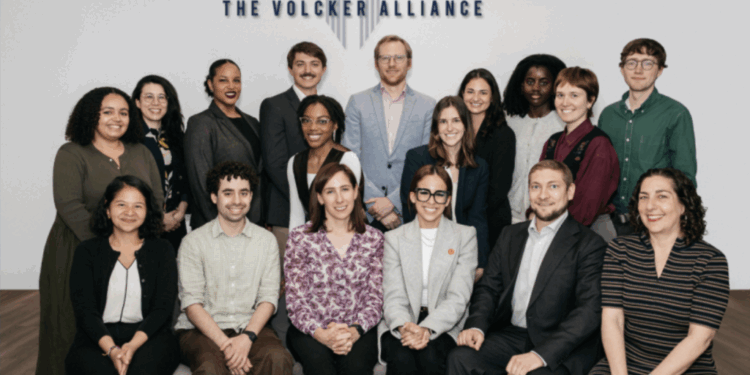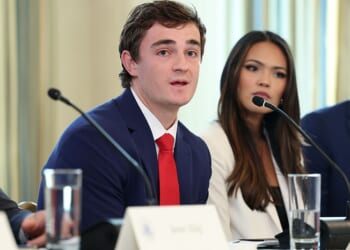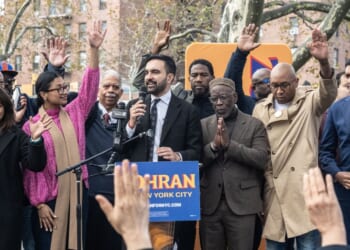The Volcker Alliance, founded in 2013 by Ronald Reagan’s Federal Reserve chair Paul Volcker, describes itself as a “nonpartisan” organization “dedicated to empowering the public sector workforce.” The group appears to have another goal as well: promoting racial preferences in academia.
The alliance’s Future Leaders of Schools of Public Service initiative, launched in 2022, refers “BIPOC colleagues” to “academic leadership opportunities” and is overseen by the deans of major public policy schools. Another program, the Safety and Justice Challenge (SJC) Future Leaders Network, offers what appear to be race-based fellowships and internships to “underrepresented” groups, though the program description does not define that term. The Volcker Alliance did not respond to a request for comment about who was eligible for the program.
When the alliance was founded in 2013, it portrayed itself as a no-nonsense organization focused on the “nuts and bolts” of governance. More recently, it has become a vocal critic of what it describes as “the Trump administration’s unprecedented threat to our nation’s public service tradition,” issuing a statement in January that lambasted the administration’s efforts to strip job protections from federal workers.
“A nonpartisan, professional civil service, selected based on merit and retained based on performance, is a bedrock of our democracy,” the statement read.
But the alliance’s own programs suggest that it has abandoned, or at least redefined, the performance-based principles it claims Trump is jettisoning. The organization says it is “doubling down” on efforts to “propel diversity in government hiring” and runs a research project on how state governments can use behavioral science to attract “underrepresented applicants.” It has also enlisted the deans of more than 75 schools of public policy to increase the “socioeconomic, racial, and ethnic diversity of public service leadership,” an initiative known as the Dean’s Summit.
A working group within the summit—co-chaired by Virginia Commonwealth University’s Susan Gooden and Syracuse University’s David van Slyke—spent the past year analyzing the “racial makeup of faculty of schools of public service,” according to a webpage about the consortium. As the deans of their respective institutions, summit members play a major role in faculty hiring and oversee nominations for the Future Leaders initiative, the program that refers minorities to “academic leadership opportunities.”
In its early years, the alliance focused mainly on state budget policy and did not discuss diversity issues at all. Its initial backers were Bridgewater founder Ray Dalio, a center-left billionaire, and the Peter G. Peterson Foundation, a nonprofit dedicated to fiscal restraint.
But as more liberal funders entered the mix, the group began to evolve from a good-governance policy shop to a progressive patronage network. In 2022, the alliance received more than $2 million from the MacArthur Foundation to create the SJC Future Leaders Network, which offers internships and fellowships to “underrepresented criminal justice talent.”
Around the same time, the alliance launched the Increasing Diversity in Government initiative with a $150,000 grant from the Alfred P. Sloan Foundation, and helped expand Arizona State University’s Next Generation Service Corps—which “prioritizes recruitment of student populations traditionally underrepresented in government”—with a $350,000 grant from the Lumina Foundation. Other big donors include Arnold Ventures and the Carnegie Corporation.
The group’s evolution reflected the way in which large foundations push progressivism onto their grant recipients. The MacArthur Foundation describes “diversity, equity, and inclusion” as a “core value” of its philanthropy, and its $2 million grant to the Volcker Alliance was earmarked for “developing leadership pathways for diverse individuals focused on criminal justice reform and advancing racial equity.”
The Lumina Foundation, meanwhile, announced in 2021 that it would prioritize grants “designed to benefit people of color” as part of a new, “equity-first” approach to grantmaking. While its grant to the Volcker Alliance did not mention race, the foundation requires staffers to describe how projects will affect “people who are Black, Hispanic, and Native American.”
Many foundations have forged ahead with DEI despite growing legal headwinds. At a webinar last year hosted by the grant management platform Fluxx, left-wing nonprofits discussed how they could continue doing race-based philanthropy by making “little tweaks” to the language on their websites, according to a Washington Free Beacon report. Though it is not clear who attended the webinar, Fluxx’s clients include the Lumina and MacArthur foundations, the most progressive of the Volcker Alliance’s funders.
The alliance itself seems to have adopted that legalistic approach. Many of its programs are carefully crafted to avoid discrimination lawsuits, said Dan Morenoff, the executive director of the American Civil Rights Project, who noted that the Future Leaders initiative relies on volunteer labor from deans and doesn’t explicitly involve employment.
“This one looks well-enough constructed that it would at least require a lot more digging to say with confidence that they are doing anything wrong,” Morenoff said.
But some of the organization’s other programs may be less legally robust.
The MacArthur-funded internships “appear to involve employment or career training,” Morenoff said. “That should make it subject to Title VII.”

















